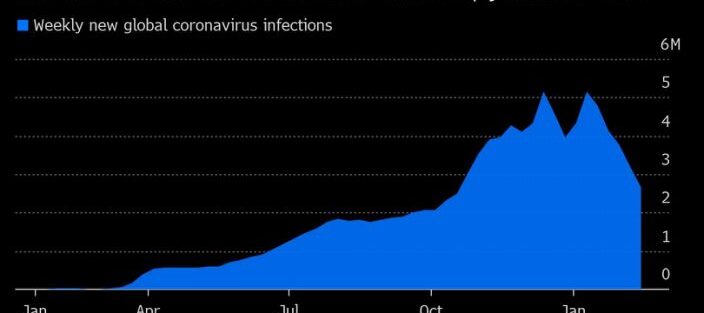Group of Seven nations are giving a major boost to Covax, the global initiative to fund vaccinations in lower-income countries, indicating momentum may be building toward a coordinated effort on the part of advanced economies to address the pandemic.
The U.S. plans to contribute as much as $4 billion to the initiative while France will donate 5% of its secured supplies. The U.K. also will announce its commitment during a G-7 call Friday. Novavax Inc. separately said it will supply 1.1 billion doses of its shot to Covax.
The vaccine supply in the U.S. is poised to double, according to an analysis by Bloomberg, though winter storms across the country continue to slow the inoculation drive. A single dose of the Pfizer Inc. vaccine significantly reduced symptoms in the first four weeks, a study showed. Brazil became the third country in the world to breach 10 million cases.
Key Developments:
Global Tracker: Cases exceed 110.3 million; deaths pass 2.4 millionVaccine Tracker: More than 193 million shots given worldwideA U.S. vaccine surge is coming, with millions of doses promisedCathay crew face 49-day work cycle on new quarantine rulesSingapore opens bubble for business travelers at Changi airportWhy delaying the second Covid shot is messy: QuickTake
Subscribe to a daily update on the virus from Bloomberg’s Prognosis team here. Click CVID on the terminal for global data on cases and deaths.
Kenya Approves AstraZeneca Shot: Daily Nation (1:52 p.m. HK)
Kenyan regulators approved the vaccine developed by AstraZeneca Plc for use in the East African nation, the Daily Nation reported. Kenya will start receiving the doses next week and start its inoculation program in March, the Nairobi-based newspaper said, citing Health Chief Administrative Secretary Mercy Mwangangi. It’s procuring the vaccine despite concerns about its limited efficacy against mild to moderate illness caused by a variant identified in South Africa.
U.S. Reiterates Food Is Unlikely Covid Source (12:38 p.m. HK)
The U.S. reiterated that food and food packaging are highly unlikely sources of coronavirus transmission, with the Food and Drug Administration saying there is “no credible evidence” to support a link.
The FDA noted in a statement Thursday that Covid-19 is a respiratory illness spread from person to person, unlike food-borne diseases spread through contaminated food. While there have been a few reports of the virus detected on food and packaging, the FDA said “the chances of infection by touching the surface of food packaging or eating food is considered to be extremely low.”
The statement is in contrast to the approach taken by China, which has been testing food imports and banning suppliers whose shipments were found to be contaminated. A World Health Organization-led team investigating the origins of the virus said last week that cold-chain food products were a likely transmission route.
South African Vaccine Roll-Out Seen Slower (12:14 p.m. HK)
A top coronavirus adviser to South Africa’s government expects a slower vaccine roll-out than what has been officially mapped out. The start of the program was delayed this month after studies showed AstraZeneca Plc’s shot, the first to arrive in South Africa, provided little protection against mild forms of the disease caused by a variant of the virusidentified late last year.
The government is targeting inoculating about 67% of the population this year. That time-line may be too ambitious, said Salim Abdool Karim, who co-chairs the health minister’s ministerial advisory committee on Covid-19. Instead, South Africa should aim to complete the first two phases, which would cover about 43% of almost 40 million people it plans to vaccinate this year, he said in an interview.
Philippines Finds Mutations (12:09 p.m. HK)
The Philippines has detected Covid-19 virus mutations in its central Visayas islands, the Department of Health said, while adding that more data are needed to determine if these make the coronavirus more transmissible and if they will be considered a new variant. The development won’t affect the push to further reopen the capital region, which is away from the area where the mutations were found, Health Secretary Francisco Duque said at an online forum Friday.
Clinical trials for the vaccine from Janssen, a division of Johnson & Johnson, have started in the Philippine capital, the Science Department said separately.
WHO Team Focuses on Ferret Badgers, Rabbits: WSJ (10:30 a.m. HK)
A team of World Health Organization scientists is focusing on two animal types — ferret badgers and rabbits — in the search for the origins of the coronavirus, the Wall Street Journal reported. The animals can carry the virus and were sold at a market in Wuhan, China, where the earliest cases of the coronavirus emerged.
The researchers say further investigation is needed into suppliers of those and other animals at the market, the Journal reported. Team members have yet to establish all the animals sold at the market.
U.K. Plans to Donate Surplus Vaccines (7:55 a.m. HK)
Prime Minister Boris Johnson will announce on Friday that the U.K. will donate surplus coronavirus vaccines to developing countries to boost the global battle against the Covid-19 pandemic.
The “majority” of any future U.K. surplus coronavirus vaccines will be shared with the World Health Organization-backed Covax program, Johnson’s office said late Thursday in a statement. That’s on top of the 548 million pounds ($766 million) the country has already donated to the program, which is aimed at supplying some of the world’s poorest nations with inoculations.
Johnson on Friday will host a video call among the leaders of the Group of Seven nations, during which he’ll encourage them to increase their Covax funding, according to the statement.
Single Pfizer Shot Reduced Illness in Health Workers (7:35 a.m. HK)
A single dose of the vaccine from Pfizer Inc. and BioNTech SE significantly reduced Covid-19 symptoms in the first four weeks after injection, according to an analysis.
Among health-care workers who got the vaccine, symptomatic infections were reduced by 85% in the 15 to 28 days after the first dose, compared with those who didn’t get a shot, according to the report in The Lancet medical journal. While most workers received a second dose on schedule — about three weeks after the first — the booster would only have just started to kick in by the end of the study, so it was essentially looking at the effects of one dose, researchers said Thursday.
The result gives support to health officials who recommend postponing second shots to quickly get first doses to as many people as possible.
Novavax to Supply 1 Billion Doses to Poorer Countries (5:40 p.m. NY)
Novavax Inc. will supply 1.1 billion doses of its experimental Covid-19 vaccine to Covax, a global alliance many low and middle-income countries are relying on to protect their populations from the virus.
The Covax Facility is an effort led by the World Health Organization, The Coalition for Epidemic Preparedness and Innovations, and Gavi, the Vaccine Alliance. Novavax, along with its manufacturing and distribution partner the Serum Institute of India, announced the commitment in a statement on Thursday, sending shares of the U.S. drugmaker up 7% in post-market trading. Novavax and Gavi haven’t yet finalized the advanced purchase agreement for supply of the two-shot regimen.
Biden to Pledge $4 Billion to Vaccines for Poorer Nations (5:10 p.m. NY)
The U.S. will contribute as much as $4 billion to Covax, the global effort to fund vaccinations in lower-income countries, but doesn’t plan on shipping any of its own vaccines abroad until the nation’s own demand has been met, officials familiar with the matter said.
President Joe Biden will announce during a Group of Seven call on Friday that the U.S. will commit $2 billion immediately to the program and pledge another $2 billion with conditions designed to spur contributions from other countries, said the officials, who spoke to reporters on condition of anonymity.
Brazil Hits 10 Million Covid Cases (3:08 p.m. NY)
Brazil cases surpassed 10 million, with infections picking up speed in recent weeks as a new variant spreads amid a shortage of vaccines.
Latin America’s largest nation reported 51,879 new cases Thursday, pushing the total confirmed to 10,030,626, according to Health Ministry data. It’s a toll that lags only the U.S. and India. Deaths rose by 1,367 to 243,457, the second-highest globally.
A U.S. Vaccine Surge Is Coming (2:48 p.m. NY)
The U.S. vaccine supply is poised to double in the coming weeks and months, according to an analysis by Bloomberg, allowing a broad expansion of doses administered across the country.
Currently, the U.S. is administering 1.6 million doses a day, constrained by the recent supply of about 10 million to 15 million doses a week. But Covid-19 vaccine manufacturers and U.S. officials have accelerated their production timelines and signaled that the spigots are about to open, providing hundreds of millions of doses to match the growing capacity to immunize people at pharmacies and mass-vaccination sites.
A review of drugmakers’ public statements and their supply deals suggests that the number of vaccines delivered should rise to almost 20 million a week in March, more than 25 million a week in April and May, and over 30 million a week June. By summer, it would be enough to give 4.5 million shots a day.
France to Donate 5% of Vaccine to Poorer Countries (1:59 p.m. NY)
France is committing to donate 5% of its secured Covid-19 vaccine supplies to poorer countries through the World Health Organization-backed Covax program.
A multilateral approach via Covax — a global alliance many developing nations are relying on for inoculations — is the most efficient way to show solidarity, a French official who asked not to be named in line with protocol, said Thursday.
©2021 Bloomberg L.P.
https://finance.yahoo.com/news/covax-gets-pledges-single-dose-002537134.html

